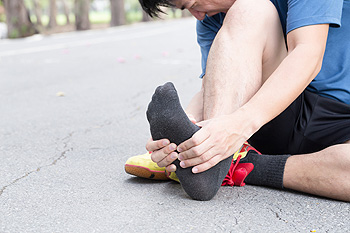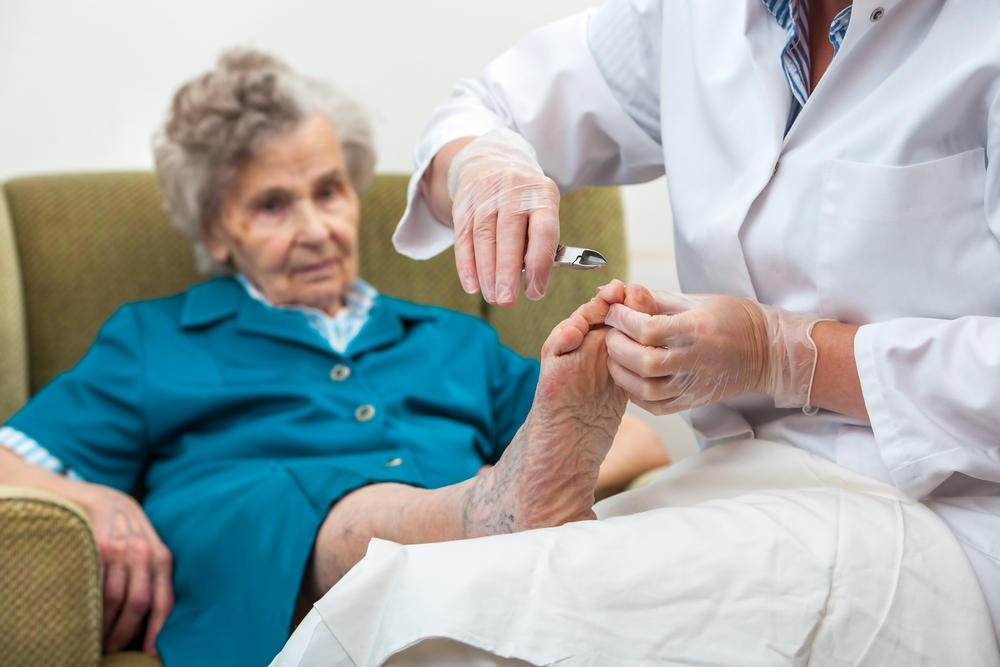March 2019
Ways to Alleviate Symptoms of Plantar Fasciitis
 Plantar Fasciitis refers to inflammation on the plantar fascia ligament, this ligament connects the heel to the toes. Overuse and strain can cause this condition, which affects the under arch of the foot and causes pain. This inflammation can also cause tension in surrounding muscles, and this can lead to the pain expanding into the calf. Stretches are beneficial in reducing tension, and therefore help to reduce overall pain. Towel curls can be performed by curling a towel with your toes. This stretch is done by placing a towel on the floor then while sitting, place your feet flat on the towel. By grasping the towel with your toes and curling inward you are stretching out the right parts of your foot. Foot flexes are also effective and are performed by sitting on the floor with your legs straight, then after wrapping an elastic band around your feet, begin to point your toes away from your body. If you believe you have plantar fasciitis, then it is highly recommended you speak to a podiatrist to learn about treatment options.
Plantar Fasciitis refers to inflammation on the plantar fascia ligament, this ligament connects the heel to the toes. Overuse and strain can cause this condition, which affects the under arch of the foot and causes pain. This inflammation can also cause tension in surrounding muscles, and this can lead to the pain expanding into the calf. Stretches are beneficial in reducing tension, and therefore help to reduce overall pain. Towel curls can be performed by curling a towel with your toes. This stretch is done by placing a towel on the floor then while sitting, place your feet flat on the towel. By grasping the towel with your toes and curling inward you are stretching out the right parts of your foot. Foot flexes are also effective and are performed by sitting on the floor with your legs straight, then after wrapping an elastic band around your feet, begin to point your toes away from your body. If you believe you have plantar fasciitis, then it is highly recommended you speak to a podiatrist to learn about treatment options.
Plantar fasciitis is a common foot condition that is often caused by a strain injury. If you are experiencing heel pain or symptoms of plantar fasciitis, contact Dr. Scott Shrem from Garden State Foot & Ankle Center. Our doctor can provide the care you need to keep you pain-free and on your feet.
What Is Plantar Fasciitis?
Plantar fasciitis is one of the most common causes of heel pain. The plantar fascia is a ligament that connects your heel to the front of your foot. When this ligament becomes inflamed, plantar fasciitis is the result. If you have plantar fasciitis you will have a stabbing pain that usually occurs with your first steps in the morning. As the day progresses and you walk around more, this pain will start to disappear, but it will return after long periods of standing or sitting.
What Causes Plantar Fasciitis?
- Excessive running
- Having high arches in your feet
- Other foot issues such as flat feet
- Pregnancy (due to the sudden weight gain)
- Being on your feet very often
There are some risk factors that may make you more likely to develop plantar fasciitis compared to others. The condition most commonly affects adults between the ages of 40 and 60. It also tends to affect people who are obese because the extra pounds result in extra stress being placed on the plantar fascia.
Prevention
- Take good care of your feet – Wear shoes that have good arch support and heel cushioning.
- Maintain a healthy weight
- If you are a runner, alternate running with other sports that won’t cause heel pain
There are a variety of treatment options available for plantar fasciitis along with the pain that accompanies it. Additionally, physical therapy is a very important component in the treatment process. It is important that you meet with your podiatrist to determine which treatment option is best for you.
If you have any questions, please feel free to contact our office located in Hazlet, NJ . We offer the newest diagnostic and treatment technologies for all your foot care needs.
Tips for Senior Foot Care
 Many elderly people may find it difficult to practice daily foot care. It’s important for seniors to wear shoes that fit comfortably, and this may prevent uncomfortable conditions from developing. These may include corns, calluses, bunions, or ingrown toenails. Research has shown the feet may change size or become wider, and it is recommended to measure them to determine the proper shoe size. Many seniors may spend the day sitting down, and poor circulation may gradually develop. This may be avoided by resisting the urge to cross the legs, in addition to frequently walking and performing gentle stretches. A common ailment that many elderly people notice is dry skin. Mild relief may be found when a moisturizer is applied several times per day. If you have questions about how to care for elderly feet, it is suggested to consult with a podiatrist.
Many elderly people may find it difficult to practice daily foot care. It’s important for seniors to wear shoes that fit comfortably, and this may prevent uncomfortable conditions from developing. These may include corns, calluses, bunions, or ingrown toenails. Research has shown the feet may change size or become wider, and it is recommended to measure them to determine the proper shoe size. Many seniors may spend the day sitting down, and poor circulation may gradually develop. This may be avoided by resisting the urge to cross the legs, in addition to frequently walking and performing gentle stretches. A common ailment that many elderly people notice is dry skin. Mild relief may be found when a moisturizer is applied several times per day. If you have questions about how to care for elderly feet, it is suggested to consult with a podiatrist.
Proper foot care is something many older adults forget to consider. If you have any concerns about your feet and ankles, contact Dr. Scott Shrem from Garden State Foot & Ankle Center. Our doctor can provide the care you need to keep you pain-free and on your feet.
The Elderly and Their Feet
As we age we start to notice many changes in our body, but the elder population may not notice them right away. Medical conditions may prevent the elderly to take notice of their foot health right away. Poor vision is a lead contributor to not taking action for the elderly.
Common Conditions
- Neuropathy – can reduce feeling in the feet and can hide many life-threatening medical conditions.
- Reduced flexibility – prevents the ability of proper toenail trimming, and foot cleaning. If left untreated, it may lead to further medical issues.
- Foot sores – amongst the older population can be serious before they are discovered. Some of the problematic conditions they may face are:
- Gouging toenails affecting nearby toe
- Shoes that don’t fit properly
- Pressure sores
- Loss of circulation in legs & feet
- Edema & swelling of feet and ankles
Susceptible Infections
Diabetes and poor circulation can cause general loss of sensitivity over the years, turning a simple cut into a serious issue.
If you have any questions please feel free to contact our office located in Hazlet, NJ . We offer the newest diagnostic and treatment technologies for all your foot and ankle needs.
Foot Surgery May Bring Relief
Many patients have foot conditions that may benefit from having foot surgery performed. This is often recommended if traditional treatment has been unsuccessful, and may be considered to find relief. Fusion surgery may help patients who have arthritis in the foot or ankle. The purpose of having this type of surgery performed is to eliminate pain and discomfort by fusing the bones together. Patients who have chronic heel pain may benefit from having heel surgery performed. This may be an option for people who are afflicted with plantar fasciitis. If you are feeling numbness or a tingling sensation in your toes, neuroma surgery may be a choice to consider. This is performed by removing a small part of the nerve, which may bring relief. If you have foot pain and are thinking about having surgery performed, it is suggested to speak with a podiatrist who can properly guide you in determining if this is right for you.
Foot surgery is sometimes necessary to treat a foot ailment. To learn more, contact Dr. Scott Shrem of Garden State Foot & Ankle Center. Our doctor will assist you with all of your foot and ankle needs.
When Is Surgery Necessary?
Foot and ankle surgery is generally reserved for cases in which less invasive, conservative procedures have failed to alleviate the problem. Some of the cases in which surgery may be necessary include:
- Removing foot deformities like bunions and bone spurs
- Severe arthritis that has caused bone issues
- Cosmetic reconstruction
What Types of Surgery Are There?
The type of surgery you receive will depend on the nature of the problem you have. Some of the possible surgeries include:
- Bunionectomy for painful bunions
- Surgical fusion for realignment of bones
- Neuropathy decompression surgery to treat nerve damage
Benefits of Surgery
Although surgery is usually a last resort, it can provide more complete pain relief compared to non-surgical methods and may allow you to finally resume full activity.
Surgical techniques have also become increasingly sophisticated. Techniques like endoscopic surgery allow for smaller incisions and faster recovery times.
If you have any questions please feel free to contact our office located in Hazlet, NJ . We offer the newest diagnostic and treatment technologies for all your foot and ankle needs.
Having an Active Lifestyle May Help to Prevent Falling
 Research has shown that falling may lead to serious conditions, which may include enduring a debilitating injury or fracturing a bone. As the aging process occurs, it may be beneficial to have frequent vision tests performed, and this may help in noticing any tripping hazards that may be present. Additionally, it may be helpful to monitor blood pressure, and this may ensure it is in a normal range. Low blood pressure may lead to dizziness, which may cause difficulty in walking. Muscle strength and flexibility in the joints and tendons may be improved while maintaining an active lifestyle. If you would like additional information about the importance of falls prevention, it is suggested to speak to a podiatrist who can properly assist you.
Research has shown that falling may lead to serious conditions, which may include enduring a debilitating injury or fracturing a bone. As the aging process occurs, it may be beneficial to have frequent vision tests performed, and this may help in noticing any tripping hazards that may be present. Additionally, it may be helpful to monitor blood pressure, and this may ensure it is in a normal range. Low blood pressure may lead to dizziness, which may cause difficulty in walking. Muscle strength and flexibility in the joints and tendons may be improved while maintaining an active lifestyle. If you would like additional information about the importance of falls prevention, it is suggested to speak to a podiatrist who can properly assist you.
Preventing falls among the elderly is very important. If you are older and have fallen or fear that you are prone to falling, consult with Dr. Scott Shrem from Garden State Foot & Ankle Center. Our doctor will assess your condition and provide you with quality advice and care.
Every 11 seconds, an elderly American is being treated in an emergency room for a fall related injury. Falls are the leading cause of head and hip injuries for those 65 and older. Due to decreases in strength, balance, senses, and lack of awareness, elderly persons are very susceptible to falling. Thankfully, there are a number of things older persons can do to prevent falls.
How to Prevent Falls
Some effective methods that older persons can do to prevent falls include:
- Enrolling in strength and balance exercise program to increase balance and strength
- Periodically having your sight and hearing checked
- Discuss any medications you have with a doctor to see if it increases the risk of falling
- Clearing the house of falling hazards and installing devices like grab bars and railings
- Utilizing a walker or cane
- Wearing shoes that provide good support and cushioning
- Talking to family members about falling and increasing awareness
Falling can be a traumatic and embarrassing experience for elderly persons; this can make them less willing to leave the house, and less willing to talk to someone about their fears of falling. Doing such things, however, will increase the likelihood of tripping or losing one’s balance. Knowing the causes of falling and how to prevent them is the best way to mitigate the risk of serious injury.
If you have any questions, please feel free to contact our office located in Hazlet, NJ . We offer the newest diagnostic and treatment technologies for all your foot care needs.
Blog Archives
- April 2025
- March 2025
- February 2025
- January 2025
- December 2024
- November 2024
- October 2024
- September 2024
- August 2024
- July 2024
- June 2024
- May 2024
- April 2024
- March 2024
- February 2024
- January 2024
- December 2023
- November 2023
- October 2023
- September 2023
- August 2023
- July 2023
- June 2023
- May 2023
- April 2023
- March 2023
- February 2023
- January 2023
- December 2022
- November 2022
- October 2022
- September 2022
- August 2022
- July 2022
- June 2022
- May 2022
- April 2022
- March 2022
- February 2022
- January 2022
- December 2021
- November 2021
- October 2021
- September 2021
- August 2021
- July 2021
- June 2021
- May 2021
- April 2021
- March 2021
- February 2021
- January 2021
- December 2020
- November 2020
- October 2020
- September 2020
- August 2020
- July 2020
- June 2020
- May 2020
- April 2020
- March 2020
- February 2020
- January 2020
- December 2019
- November 2019
- October 2019
- September 2019
- August 2019
- July 2019
- June 2019
- May 2019
- April 2019
- March 2019
- February 2019
- January 2019
- December 2018
- November 2018
- October 2018
- September 2018
- August 2018
- July 2018
- June 2018
- May 2018
- April 2018
- March 2018









